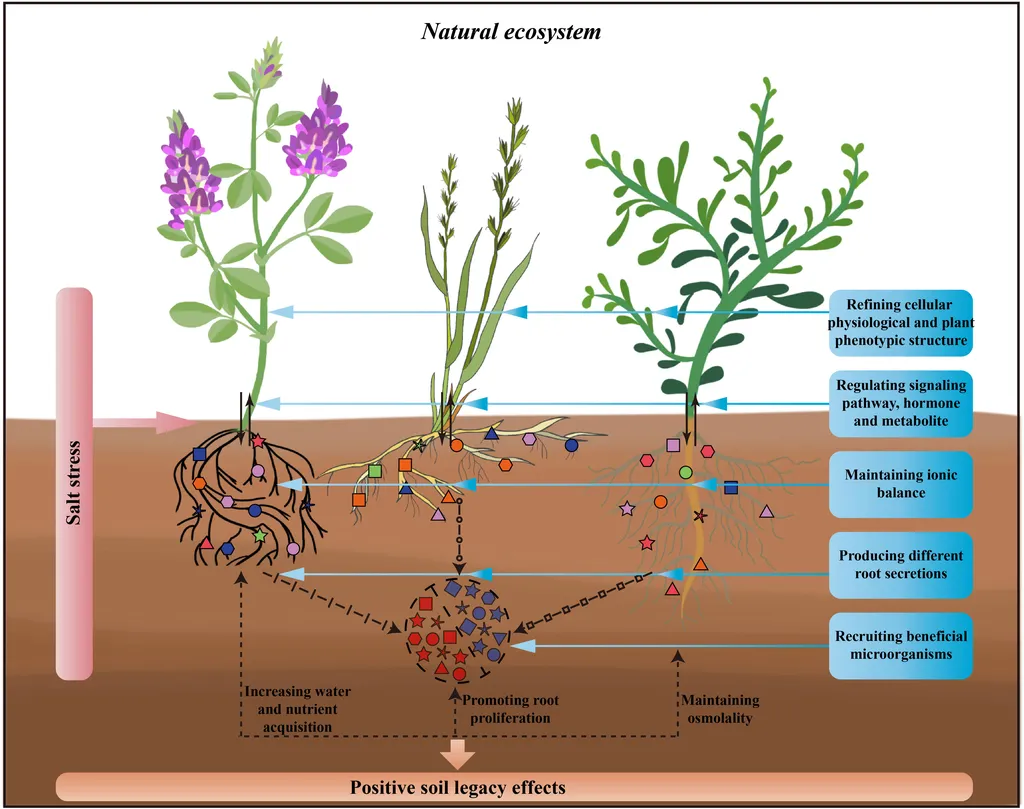In the face of escalating soil salinization, a silent crisis threatening global food security, a groundbreaking review published in *Plant Stress* offers a beacon of hope. The study, led by Hafiz Abdul Kareem from the State Key Laboratory for Crop Stress Resistance and High-Efficiency Production at Northwest A&F University, reveals how nanotechnology and microbiome engineering could revolutionize agriculture by enhancing crop resilience to salt stress.
Soil salinization already compromises about a third of irrigated agricultural fields, and projections suggest this could rise to 50% by 2050. Traditional approaches to mitigating salt stress have shown limited success, but recent advances in nanotechnology and multi-omics approaches are opening new avenues. The review highlights how nano-enabled agrochemicals can selectively enrich beneficial microbial consortia in the rhizosphere, the root zone of plants, fostering salt stress tolerance through multiple mechanisms.
“Smart nanomaterials, such as biodegradable chitosan-based nanocarriers and metallic nanoparticles with controlled dissolution kinetics, can precisely deliver bioactive compounds that promote the assembly of beneficial microbiomes,” explains Kareem. These nanocarriers can enhance the colonization of key salt-tolerant taxa like Halomonas, Azospirillum, and specialized fungal endophytes, which in turn boost plant resilience to saline conditions.
The integration of spatially-resolved metatranscriptomics with metabolome profiling has unveiled previously unrecognized signaling networks that mediate salt stress responses. This holistic approach has revealed synchronized metabolic adaptations between host plants and their microbiota, offering a deeper understanding of how plants cope with salinity.
One of the most intriguing findings is the nanoparticles-induced epigenetic modifications in both microorganisms and plants. These modifications underpin stress memory and transgenerational adaptation to salinity, suggesting that the benefits of these interventions could be passed down through generations of crops.
The commercial implications of this research are profound. Next-generation nanobioformulations with programmable microbiome-modulating properties have already demonstrated remarkable efficacy in enhancing crop yields under saline conditions. This could translate into significant economic gains for farmers, particularly in regions where soil salinization is a major challenge.
Moreover, the review proposes an integrated research framework combining advanced high-throughput phenotyping and synthetic biology approaches. This framework aims to accelerate the development of “salt-smart” crops with custom-designed microbiomes, tailored to thrive in saline environments. Such innovations could be a game-changer for sustainable agriculture in a changing climate.
As the global population continues to grow and climate change exacerbates environmental stresses, the need for resilient and productive crops has never been greater. This research not only sheds light on the intricate interplay between nanotechnology, microbiomes, and plant stress responses but also paves the way for future developments in the field. By harnessing the power of nanotechnology and microbiome engineering, we may soon see a new era of salt-tolerant, high-yielding crops that can withstand the challenges posed by a changing climate.

